


 National Academy of Agricultural Sciences (NAAS)
National Academy of Agricultural Sciences (NAAS)

|
PRINT ISSN : 2319-7692
Online ISSN : 2319-7706 Issues : 12 per year Publisher : Excellent Publishers Email : editorijcmas@gmail.com / submit@ijcmas.com Editor-in-chief: Dr.M.Prakash Index Copernicus ICV 2018: 95.39 NAAS RATING 2020: 5.38 |
Vegetables are important constituents of Indian agriculture and nutritional security due to their short duration, high yield, nutritional richness, economic viability and ability to generate on-farm and off-farm employment. Today, India is the second largest producer of the vegetables (90.8 Mt) in the world, contributing 14.45 per cent of the total world production. Micro-irrigation is introduced primarily to save water and increase the water use efficiency in agriculture. It has created interest because of decreased water requirement and possible increase in production. The system has proved its superiority over other conventional method of irrigation. It also has the potential to increase the yield of crops even at reduced irrigation water application. The concept of Horticulture is shifting from maximizing yield to maximizing value with water management assumes paramount importance to reduce the wastage of water to increase the water use efficiency. The need of the hour is therefore, maximising the production per unit drop of water. Hence in the present day context, lot of emphasis is being given in improving the irrigation practices to increase the vegetable production and to sustain the productivity levels. Drip fertigation with water soluble fertilizer improved the root system by inducing effect on the root architecture especially in the production of highly fibrous root system. Reduction in water consumption due to drip method of irrigation over the surface method of irrigation varies from 30 to 70 per cent and productivity gain in the range of 20 to 80 per cent for different vegetable crops. Fertigation is the technique of supplying dissolved fertilizer to crops through an irrigation system. Small applications of soluble nutrients saves labour, reduces compaction in the field, thereby enhancing productivity. Fertigation allows nutrient placement directly into the plant root zone during critical periods in the required dose. By introducing drip fertigation, it is possible to increase the yield potential of vegetable crops by three fold with the same quantity of water. All these emphasize the need for water conservation, improvement in productivity and resource use efficiency to achieve in vegetable crops.
 |
 |
 |
 |
 |